Unit 8 Our Clothes Topic 2 Section A课件(共30张PPT)仁爱版八年级下册
文档属性
| 名称 | Unit 8 Our Clothes Topic 2 Section A课件(共30张PPT)仁爱版八年级下册 | 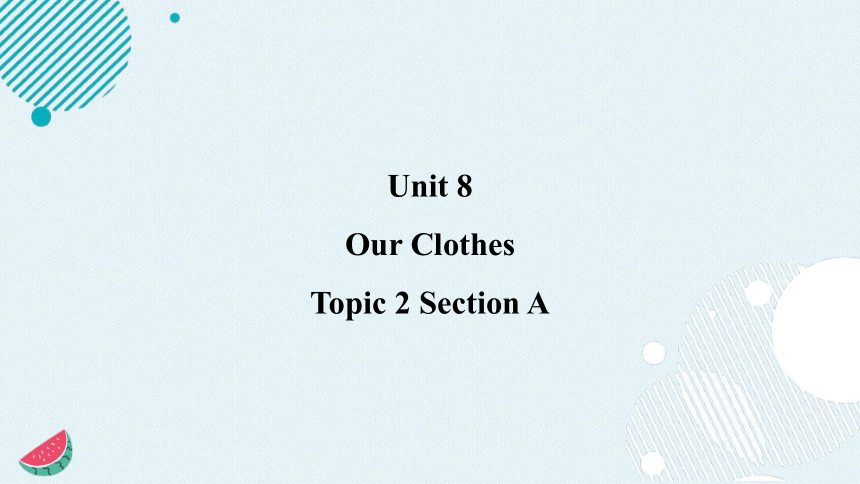 | |
| 格式 | pptx | ||
| 文件大小 | 4.5MB | ||
| 资源类型 | 教案 | ||
| 版本资源 | 仁爱科普版 | ||
| 科目 | 英语 | ||
| 更新时间 | 2024-11-24 09:53:39 | ||
图片预览

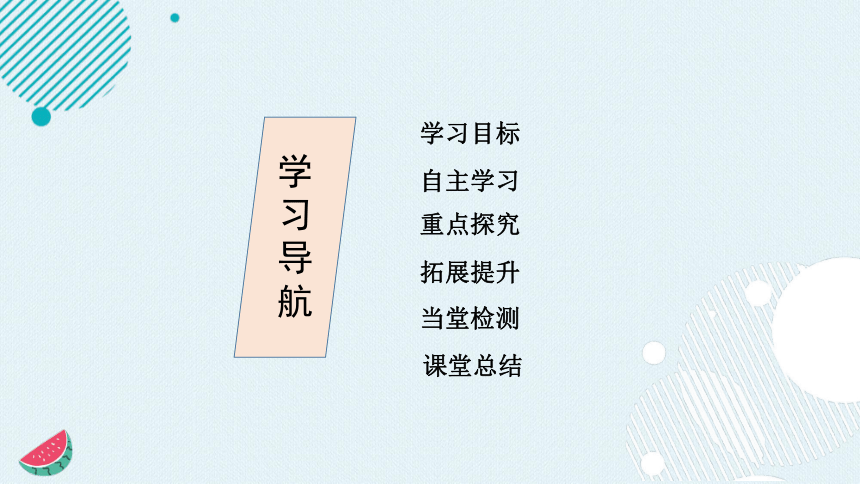
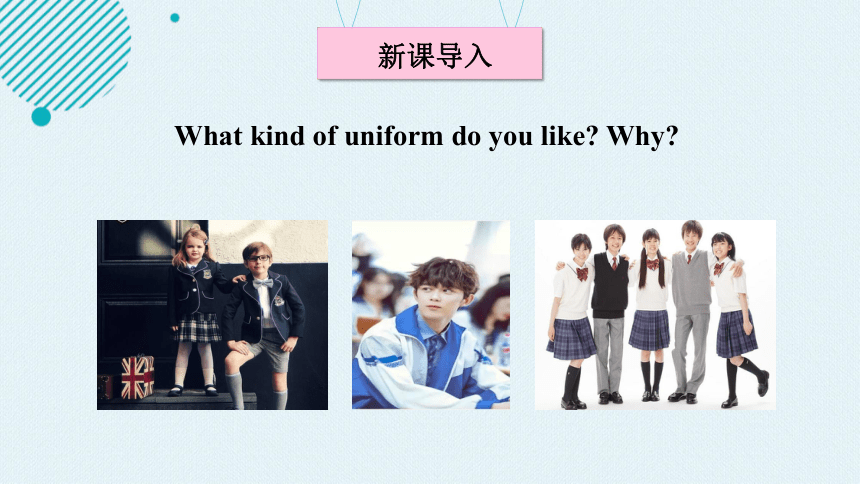
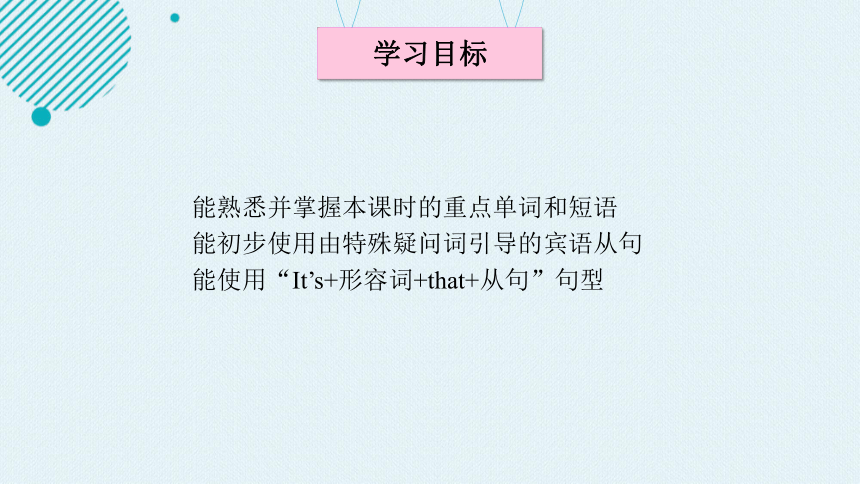
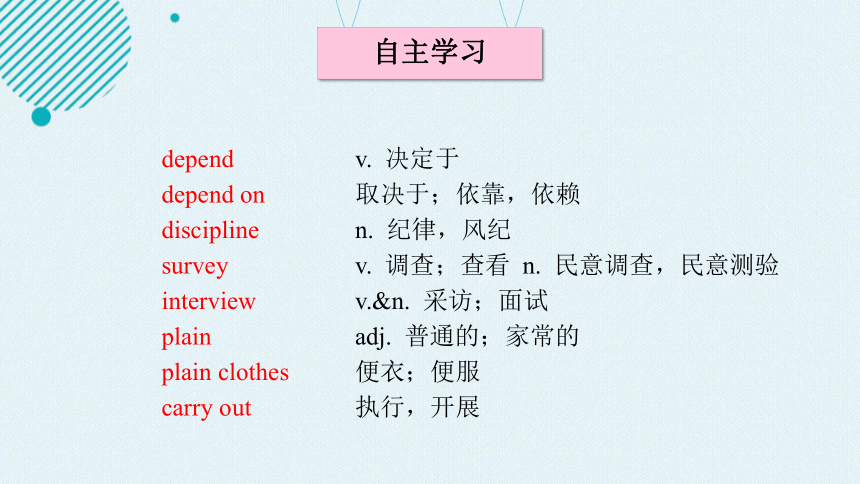
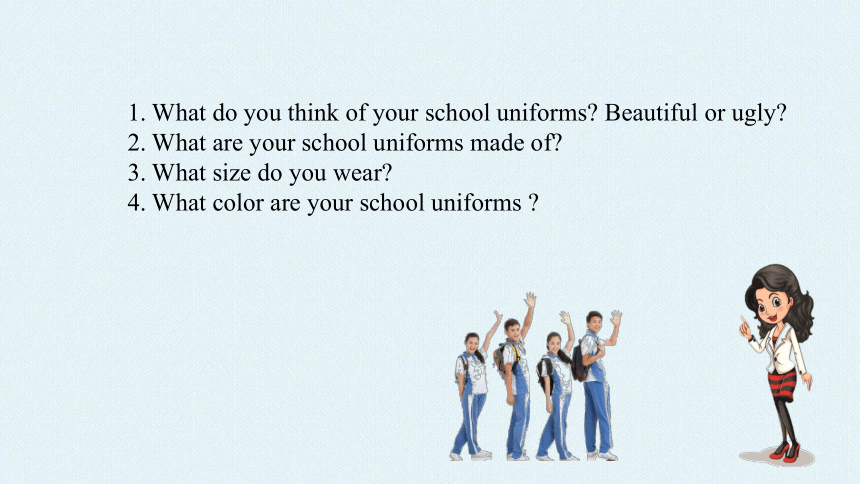
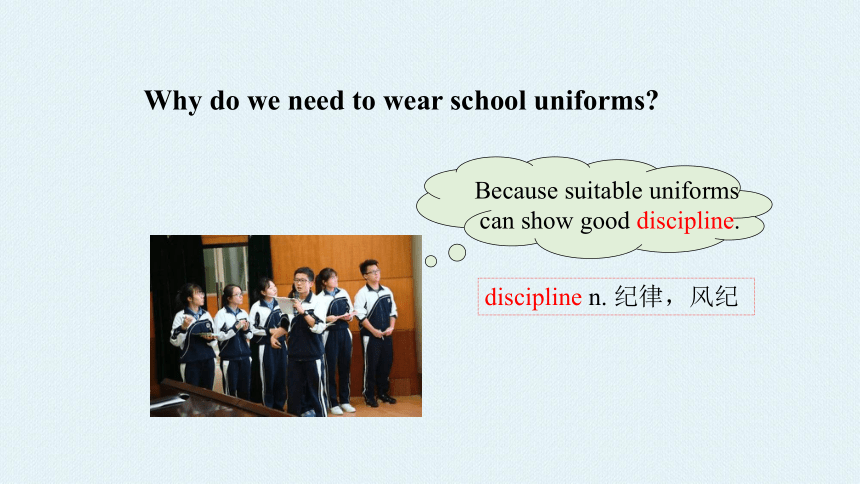

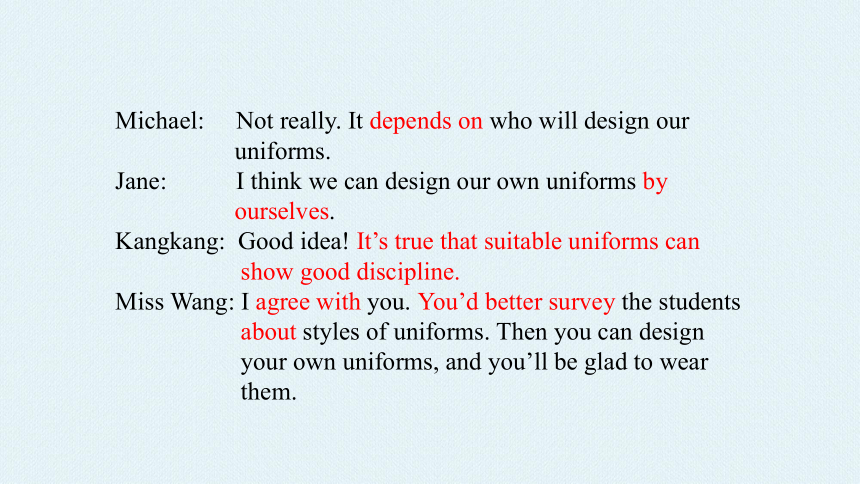
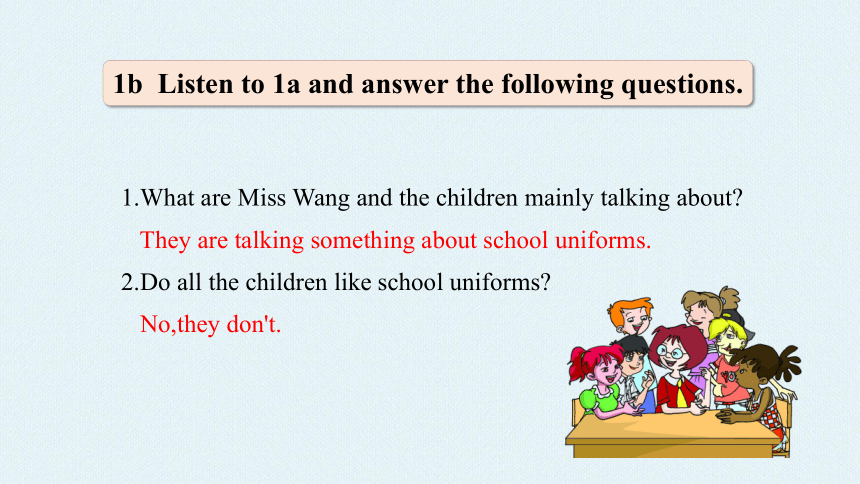
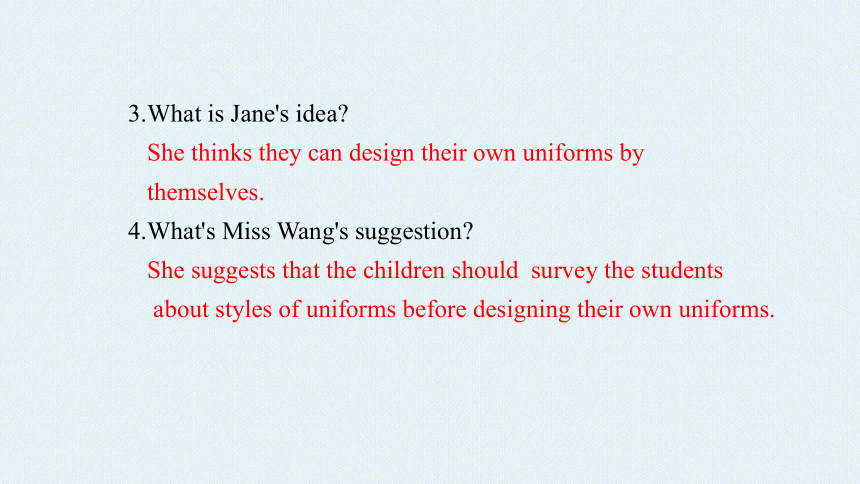
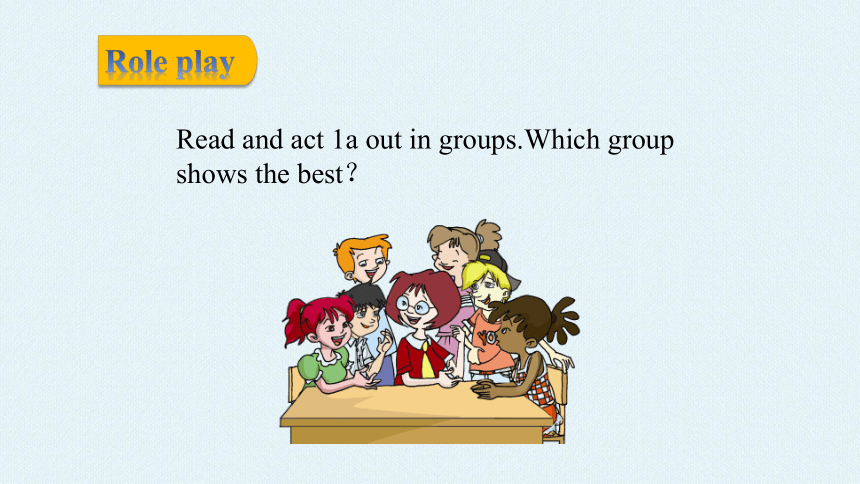
文档简介
(共30张PPT)
Unit 8
Our Clothes
Topic 2 Section A
学习目标
重点探究
自主学习
学习导航
当堂检测
课堂总结
拓展提升
新课导入
What kind of uniform do you like Why
学习目标
能熟悉并掌握本课时的重点单词和短语
能初步使用由特殊疑问词引导的宾语从句能使用“It’s+形容词+that+从句”句型
自主学习
depend v. 决定于
depend on 取决于;依靠,依赖
discipline n. 纪律,风纪
survey v. 调查;查看 n. 民意调查,民意测验
interview v.&n. 采访;面试
plain adj. 普通的;家常的
plain clothes 便衣;便服
carry out 执行,开展
What do you think of your school uniforms Beautiful or ugly
What are your school uniforms made of
What size do you wear
What color are your school uniforms
discipline n. 纪律,风纪
Why do we need to wear school uniforms
Because suitable uniforms
can show good discipline.
重点探究
Miss Wang: Boys and girls, our school plans to make
uniforms for you.
Jane: Kangkang, can you tell me what Miss Wang
says
Kangkang: She says that our school plans to make uniforms
for us.
Maria: I like to wear my own clothes because school
uniforms will look ugly on us.
1a Listen, look and say.
Michael: Not really. It depends on who will design our
uniforms.
Jane: I think we can design our own uniforms by
ourselves.
Kangkang: Good idea! It’s true that suitable uniforms can
show good discipline.
Miss Wang: I agree with you. You’d better survey the students
about styles of uniforms. Then you can design
your own uniforms, and you’ll be glad to wear
them.
1.What are Miss Wang and the children mainly talking about
They are talking something about school uniforms.
2.Do all the children like school uniforms
No,they don't.
1b Listen to 1a and answer the following questions.
3.What is Jane's idea
She thinks they can design their own uniforms by
themselves.
4.What's Miss Wang's suggestion
She suggests that the children should survey the students
about styles of uniforms before designing their own uniforms.
Read and act 1a out in groups.Which group shows the best?
Role play
Example:
A:Can you tell me what Maria asks
B:She asks what materials they should choose.
1c The children are discussing how to design their school
uniforms. Make up conversations after the example.
What color do you want
Where can we make them
What style do you like
What materials should
we choose
A.Is it important for you to wear uniforms at work
B.Could you tell me when you wear your uniforms
C.And our uniforms may stop some people from
doing bad things.
2a Listen to the conversation and put A, B and C in the
right places.
(K—Kangkang, P—Policewoman)
K: Excuse me, madam._________________________
P: We usually wear uniforms when we are at work, but
sometimes we wear plain clothes to carry out special tasks.
K: ____________________________
P: Sure.When we are wearing uniforms, people in trouble can find us. _______________________________
K: Uniforms can also show good discipline and make you
look important.
P: Yes.You’re right.
(Kangkang is interviewing a policewoman.)
B
A
C
1.When does the policewoman wear her uniform
They wear uniforms when they are at work.
2.Why does the policewoman think it's important to wear uniforms
Because when they are wearing uniforms,people in trouble can find them,and their uniforms may stop some people from doing bad things.
2b Read 2a and answer the following questions.
Then try to give a short report.
policeman
policewoman
doctor
nurse
cook
postman
worker
office worker
Pretend to interview each other and make a
conversation similar to 2a. Then role-play in pairs.
Example:
A: Could you please tell me what clothes you like best
B: Sure. I like jeans best.
3 Make up conversations after the example, using the
sentences in the box. Pay attention to the word order
of object clause.
What clothes do you like best
What do you like to wear in summer
When/Where do you wear school uniforms
Why do/don't you like school uniforms
How often do you go shopping
Who usually buys clothes for you
...
Language points
拓展提升
1. Our school plans to make uniforms for you.
学校计划给你们定做校服。
plan to do sth. 计划做某事;
A. uniform n. (尤指军人、学生或警察飞行员等的)制服;
e.g. a school uniform 学校制服;
B. clothes n. 通常指身上的各种服装,包括上衣、裤子、
内衣等。它是复数名词,不能直接与数词连用。
e.g. She often wears beautiful clothes. 她经常穿漂亮的衣服。
C. clothing n. 是物质名词,服装的总称,除衣服外还包
括帽子、鞋袜等。没有复数形式。
一件衣服要说 an article of clothing。
2. Can you tell me what Miss Wang says
你能告诉我王老师说了什么吗?
本句为含有特殊疑问词what引导的宾语从句的复合句。
拆散为两个简单句看看其变化:
(1) Can you tell me (2) What does Miss Wang say
把特殊疑问句转为宾语从句的变化步骤:
①引导词:特殊疑问词(不能省略);
②语序:陈述句语序,即“主语+谓语+其他”
③人称变化
④时态变化
e.g. Can you tell me Who are you waiting for
Can you tell me who you are waiting for
你能告诉我你在等谁吗?
3. I like to wear my own clothes because school uniforms
will look ugly on us.
我喜欢穿自己的衣服,因为校服穿在身上会很难看。
look ugly on us 穿在我们身上会很难看;
注意:on sb.穿在某人身上,in sth.穿着某件衣服。
e.g. She was all in black. 她穿着一身黑。
The dress looks very nice on her.
那件礼服穿在她身上非常漂亮。
4. It depends on who will design our uniforms.
那取决于谁设计我们的校服。
depend on/upon sb./sth. 意为“依靠”,依赖;取决于;
由……决定。
e.g. You shouldn't always depend on your parents.
你不能总是依赖父母。
5. It’s true that suitable uniforms can show good discipline.
得体的校服的确能展示我们良好的风纪。
本句是一个用it作形式主语的复合句,真正的主语是
that从句,类似的用法还有:It is necessary/important/
well-known/possible/wonderful that ... 意为“……是必要
的/重要的/众所周知的/可能的/极好的”。
A. show sth. 意为“展示某物”。
e.g. Please show your ID card. 请出示你的身份证。
B. show sb. sth. = show sth. to sb.
意为“把……指给……看;出示”。
e.g. Jackie showed her the passport. 杰基向她出示了护照。
C. show sb. around/ round意为“带某人参观”。
e.g. I'll show you around/ round the school.
我会带你到学校四处看看。
6. I agree with you. 我同意你的意见。
agree with…意为“同意……”。
表示和某人的观点一致用agree with sb.。
e.g. He agrees with me. 他同意我的意见。
7. Could you tell me when you wear your uniforms
你能告诉我你们什么时候穿制服吗?
A. when 引导宾语从句时译为“什么时候”。
e.g. I don’t know when he will come.
我不知道他什么时候会来。(宾语从句)
B. when 引导时间状语从句时译为“当······时”。
e.g. Patients can find us easily when they are in need.
当病人有需要时,他们能够很容易地找到我们。
(时间状语从句)
8. We usually wear uniforms when we are at work, but
sometimes we wear plain clothes to carry out special tasks.
我们通常上班期间穿制服,但有时候穿便装执行特殊
任务。
wear uniforms 穿制服;
at work(人)在工作,(机器)在运转;
e.g. They are at work. 他们在工作。
plain clothes 便装;
carry out 执行,实施;
special tasks 特殊任务;
9. And our uniforms may stop some people from doing bad things.
我们的制服可以阻止一些人干坏事。
1)A. stop ... from doing sth. = keep ... from doing sth.
阻止,防止······干某事;
e.g. You can’t stop people from saying what they think.
你无法阻止人们说出自己的想法。
B. stop doing sth. 停止做某事(停止正在做的事情);
e.g. Suddenly everyone stopped talking.
突然每个人都停下来不说话了。
C. stop to do sth. 停下(正在做的事)去做(另一件事);
e.g. We stopped to take pictures. 我们停下来去照相。
2)bad things意为“坏事”。
e.g. Mother asks me not to do bad things. 妈妈让我不要做坏事。
当堂检测
It __________ (取决于) who will design our uniforms.
2. Uniforms can also show good _________(纪律) and make you look important.
3. We usually wear uniforms when we are at work, but sometimes we wear ___________(便装) to ________(执行) special tasks.
4.You’d better _______(调查) the students about style of uniforms.
5.Kangkang is ___________(采访) a policewoman.
depends on
discipline
plain clothes
carry out
survey
interviewing
一、根据汉语提示完成句子。
课堂总结
Unit 8 Topic 2
Section A
重点单词和短语:
depend, discipline, survey, interview, plain depend on, plain clothes, carry out, stop...from doing...
特殊疑问词引导的宾语从句:
从句语序要用1._________;
It做形式主语的复合句:
It 用作形式主语, 当_______或________从句在某个句子中作_______时,为保持句子结构前后平衡,避免头重脚轻,因此常用it作形式主语_________,而将真正的______放在句尾。此时it只起先行引导作用,本身无词义。
陈述语序
不定式
短语
主语
置于句首
主语
Unit 8
Our Clothes
Topic 2 Section A
学习目标
重点探究
自主学习
学习导航
当堂检测
课堂总结
拓展提升
新课导入
What kind of uniform do you like Why
学习目标
能熟悉并掌握本课时的重点单词和短语
能初步使用由特殊疑问词引导的宾语从句能使用“It’s+形容词+that+从句”句型
自主学习
depend v. 决定于
depend on 取决于;依靠,依赖
discipline n. 纪律,风纪
survey v. 调查;查看 n. 民意调查,民意测验
interview v.&n. 采访;面试
plain adj. 普通的;家常的
plain clothes 便衣;便服
carry out 执行,开展
What do you think of your school uniforms Beautiful or ugly
What are your school uniforms made of
What size do you wear
What color are your school uniforms
discipline n. 纪律,风纪
Why do we need to wear school uniforms
Because suitable uniforms
can show good discipline.
重点探究
Miss Wang: Boys and girls, our school plans to make
uniforms for you.
Jane: Kangkang, can you tell me what Miss Wang
says
Kangkang: She says that our school plans to make uniforms
for us.
Maria: I like to wear my own clothes because school
uniforms will look ugly on us.
1a Listen, look and say.
Michael: Not really. It depends on who will design our
uniforms.
Jane: I think we can design our own uniforms by
ourselves.
Kangkang: Good idea! It’s true that suitable uniforms can
show good discipline.
Miss Wang: I agree with you. You’d better survey the students
about styles of uniforms. Then you can design
your own uniforms, and you’ll be glad to wear
them.
1.What are Miss Wang and the children mainly talking about
They are talking something about school uniforms.
2.Do all the children like school uniforms
No,they don't.
1b Listen to 1a and answer the following questions.
3.What is Jane's idea
She thinks they can design their own uniforms by
themselves.
4.What's Miss Wang's suggestion
She suggests that the children should survey the students
about styles of uniforms before designing their own uniforms.
Read and act 1a out in groups.Which group shows the best?
Role play
Example:
A:Can you tell me what Maria asks
B:She asks what materials they should choose.
1c The children are discussing how to design their school
uniforms. Make up conversations after the example.
What color do you want
Where can we make them
What style do you like
What materials should
we choose
A.Is it important for you to wear uniforms at work
B.Could you tell me when you wear your uniforms
C.And our uniforms may stop some people from
doing bad things.
2a Listen to the conversation and put A, B and C in the
right places.
(K—Kangkang, P—Policewoman)
K: Excuse me, madam._________________________
P: We usually wear uniforms when we are at work, but
sometimes we wear plain clothes to carry out special tasks.
K: ____________________________
P: Sure.When we are wearing uniforms, people in trouble can find us. _______________________________
K: Uniforms can also show good discipline and make you
look important.
P: Yes.You’re right.
(Kangkang is interviewing a policewoman.)
B
A
C
1.When does the policewoman wear her uniform
They wear uniforms when they are at work.
2.Why does the policewoman think it's important to wear uniforms
Because when they are wearing uniforms,people in trouble can find them,and their uniforms may stop some people from doing bad things.
2b Read 2a and answer the following questions.
Then try to give a short report.
policeman
policewoman
doctor
nurse
cook
postman
worker
office worker
Pretend to interview each other and make a
conversation similar to 2a. Then role-play in pairs.
Example:
A: Could you please tell me what clothes you like best
B: Sure. I like jeans best.
3 Make up conversations after the example, using the
sentences in the box. Pay attention to the word order
of object clause.
What clothes do you like best
What do you like to wear in summer
When/Where do you wear school uniforms
Why do/don't you like school uniforms
How often do you go shopping
Who usually buys clothes for you
...
Language points
拓展提升
1. Our school plans to make uniforms for you.
学校计划给你们定做校服。
plan to do sth. 计划做某事;
A. uniform n. (尤指军人、学生或警察飞行员等的)制服;
e.g. a school uniform 学校制服;
B. clothes n. 通常指身上的各种服装,包括上衣、裤子、
内衣等。它是复数名词,不能直接与数词连用。
e.g. She often wears beautiful clothes. 她经常穿漂亮的衣服。
C. clothing n. 是物质名词,服装的总称,除衣服外还包
括帽子、鞋袜等。没有复数形式。
一件衣服要说 an article of clothing。
2. Can you tell me what Miss Wang says
你能告诉我王老师说了什么吗?
本句为含有特殊疑问词what引导的宾语从句的复合句。
拆散为两个简单句看看其变化:
(1) Can you tell me (2) What does Miss Wang say
把特殊疑问句转为宾语从句的变化步骤:
①引导词:特殊疑问词(不能省略);
②语序:陈述句语序,即“主语+谓语+其他”
③人称变化
④时态变化
e.g. Can you tell me Who are you waiting for
Can you tell me who you are waiting for
你能告诉我你在等谁吗?
3. I like to wear my own clothes because school uniforms
will look ugly on us.
我喜欢穿自己的衣服,因为校服穿在身上会很难看。
look ugly on us 穿在我们身上会很难看;
注意:on sb.穿在某人身上,in sth.穿着某件衣服。
e.g. She was all in black. 她穿着一身黑。
The dress looks very nice on her.
那件礼服穿在她身上非常漂亮。
4. It depends on who will design our uniforms.
那取决于谁设计我们的校服。
depend on/upon sb./sth. 意为“依靠”,依赖;取决于;
由……决定。
e.g. You shouldn't always depend on your parents.
你不能总是依赖父母。
5. It’s true that suitable uniforms can show good discipline.
得体的校服的确能展示我们良好的风纪。
本句是一个用it作形式主语的复合句,真正的主语是
that从句,类似的用法还有:It is necessary/important/
well-known/possible/wonderful that ... 意为“……是必要
的/重要的/众所周知的/可能的/极好的”。
A. show sth. 意为“展示某物”。
e.g. Please show your ID card. 请出示你的身份证。
B. show sb. sth. = show sth. to sb.
意为“把……指给……看;出示”。
e.g. Jackie showed her the passport. 杰基向她出示了护照。
C. show sb. around/ round意为“带某人参观”。
e.g. I'll show you around/ round the school.
我会带你到学校四处看看。
6. I agree with you. 我同意你的意见。
agree with…意为“同意……”。
表示和某人的观点一致用agree with sb.。
e.g. He agrees with me. 他同意我的意见。
7. Could you tell me when you wear your uniforms
你能告诉我你们什么时候穿制服吗?
A. when 引导宾语从句时译为“什么时候”。
e.g. I don’t know when he will come.
我不知道他什么时候会来。(宾语从句)
B. when 引导时间状语从句时译为“当······时”。
e.g. Patients can find us easily when they are in need.
当病人有需要时,他们能够很容易地找到我们。
(时间状语从句)
8. We usually wear uniforms when we are at work, but
sometimes we wear plain clothes to carry out special tasks.
我们通常上班期间穿制服,但有时候穿便装执行特殊
任务。
wear uniforms 穿制服;
at work(人)在工作,(机器)在运转;
e.g. They are at work. 他们在工作。
plain clothes 便装;
carry out 执行,实施;
special tasks 特殊任务;
9. And our uniforms may stop some people from doing bad things.
我们的制服可以阻止一些人干坏事。
1)A. stop ... from doing sth. = keep ... from doing sth.
阻止,防止······干某事;
e.g. You can’t stop people from saying what they think.
你无法阻止人们说出自己的想法。
B. stop doing sth. 停止做某事(停止正在做的事情);
e.g. Suddenly everyone stopped talking.
突然每个人都停下来不说话了。
C. stop to do sth. 停下(正在做的事)去做(另一件事);
e.g. We stopped to take pictures. 我们停下来去照相。
2)bad things意为“坏事”。
e.g. Mother asks me not to do bad things. 妈妈让我不要做坏事。
当堂检测
It __________ (取决于) who will design our uniforms.
2. Uniforms can also show good _________(纪律) and make you look important.
3. We usually wear uniforms when we are at work, but sometimes we wear ___________(便装) to ________(执行) special tasks.
4.You’d better _______(调查) the students about style of uniforms.
5.Kangkang is ___________(采访) a policewoman.
depends on
discipline
plain clothes
carry out
survey
interviewing
一、根据汉语提示完成句子。
课堂总结
Unit 8 Topic 2
Section A
重点单词和短语:
depend, discipline, survey, interview, plain depend on, plain clothes, carry out, stop...from doing...
特殊疑问词引导的宾语从句:
从句语序要用1._________;
It做形式主语的复合句:
It 用作形式主语, 当_______或________从句在某个句子中作_______时,为保持句子结构前后平衡,避免头重脚轻,因此常用it作形式主语_________,而将真正的______放在句尾。此时it只起先行引导作用,本身无词义。
陈述语序
不定式
短语
主语
置于句首
主语
同课章节目录
- Unit 5 Feeling excited
- Topic 1 You look excited
- Topic 2 I’m feeling better now.
- Topic 3 Many things can affect our feelings.
- Unit 6 Enjoying Cycling
- Topic 1 We're going on a three-day visit to Mount
- Topic 2 How about exploring Tian’anmen Square?
- Topic 3 Bicycle riding is good exercise.
- Unit 7 Food festival
- Topic 1 We’re preparing for a food festival.
- Topic 2 I’m not sure whether I can cook it well.
- Topic 3 I Cooked the Most Successfully
- Unit 8 Our Clothes
- Topic 1 We will have a class fashion show.
- Topic 2 We can design our own uniforms.
- Topic 3 He said the fashion show was wonderful.
